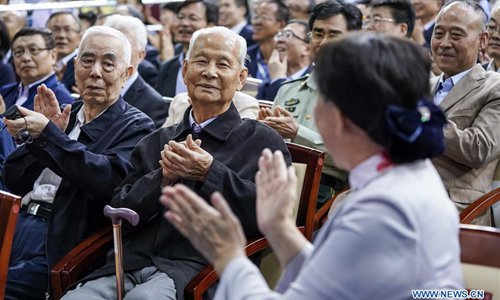
Li Zhong (2nd L, front), a 99-year-old alumnus of the National Southwest Associated University, a wartime union of universities which included Peking University (PKU), attends a ceremony marking the 120th anniversary of PKU at the Peking University Khoo Teck Puat Gymnasium in Beijing, capital of China, May 4, 2018. (Xinhua/Shen Bohan)
A documentary film focusing on the youth of Chinese scholars from China’s National Southwest Associated University, such as Nobel winner for physics Yang Zhengning, has been getting high praise from moviegoers since it hit cinemas in the Chinese mainland on Friday. The stories of these national treasures, all of whom are now over 90 years old, have moved audiences.
The film has a rating of 8.0/10 on Chinese media review platform Douban and has ranked at No.2 on the site’s popularity index for the week, behind A Quiet Place: Part II.
During the War of Resistance against Japanese Aggression (1931-45) a special university was established in Southwest China’s Yunnan Province. The university, a combination of three top Chinese universities, existed for just eight years, but its influence on the country was immense as it produced two Nobel Prize winners, five winners of China’s Top Science and Technology Award and more than 100 masters of humanities.
The documentary, One Day When We Were Young, recalls 16 outstanding students' time at the university as the flames of war ravaged the country.
These scholars, such as Yang and well-known translator Xu Yuanchong, who translated Marcel Proust’s masterpiece In Search of Lost Time into Chinese, all appear in the documentary.
Although the war posed a constant threat, their time at the university was still fruitful and enjoyable. They once toured an entire city together to listen to “the best Chinese lesson in history,” debated with each other about national and social issues in local tea houses and even applied to help the war effort by working with the American Volunteer Group.
Whether seen in the works of famous Chinese writer Wang Zengqi or in the documentary, young audiences were shocked by the hot-blooded youth of these scholars.
In a post on Chinese social media platform WeChat, Tencent Pictures, one of the production companies behind the film, wrote that the film seeks to inspire audiences to rediscover the reasons we study, to reflect on the meaning and value of life, to explore the nature of education and universities, and to think about the key for creating a great nation.
Some netizens said they were inspired by these scholars, whose spirit stands in stark contrast to today, a time when a dispirited lifestyle, called tangping (or lie down), has become viral among young Chinese people.
“I highly recommend the movie, and it is definitely worth buying a ticket to support it,” one viewer in Beijing surnamed Xu told the Global Times on Monday.
Xu said that every era has its confusion and contradictions. “However, when you watch the film and see this group of wise and time-hardened people, you will surely begin to think about the meaning of your life and become more determined to follow the road that you have been exploring all along despite today’s increasingly prevalent tangping culture. In the film, we not only see the strong will of these masters, but also see the extraordinary life a young person should have.”
Several national heroes have been lost one after another in May, including “the Father of Hybrid Rice” Yuan Longping and top Chinese hepatobiliary surgeon Wu Mengchao.
Some viewers said they came to appreciate these pioneers while watching the movie. Another young moviegoer living in North China’s Shanxi Province said that she hopes for longevity and health for these aged masters.

